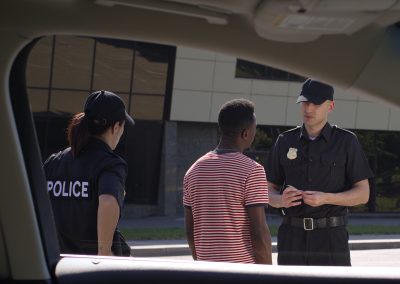All hell has broken loose in Baltimore. Everyone is pointing fingers.
According to some of the loudest voices in the community, the police started this with their heavy-handed enforcement: it’s the cop’s fault. According to the police, it’s the protester’s fault because the protestors are using the death of Freddie Gray as a convenient excuse to burn, attack, rob and victimize the truly innocent.
According to the politicians, well, it’s not their fault …
Watching all of this chaos, the pundits and politicians are all looking for a quick answer and antagonist that can be blamed. Sadly, it’s all too typical.
From the Commander in Chief
“There are some police that aren’t doing the right things.” That’s what President Obama said late this morning during a press conference. That riled me up. I have to admit it, I was pissed.
I don’t disagree at all that some police agencies have allowed cultures of corruption to take control. Poor, and sometimes criminal, practices do occur with some frequency in some (very few) departments. But it seems all cops routinely get the blame despite the preponderance of good they do.
So when the president said what he said, I got mad and was ready to turn the TV off. But the president continued, and I listened. He said:
“We just can’t leave this to the police. I think there are some police departments that have to do some soul-searching. But I think that as a country we have to do some soul-searching. This is not new. It’s been going on for decades. And without making excuses for criminal activities that take in these communities what we also know is that if you have impoverished communities that have been stripped away of opportunity, where children are born into abject poverty, they’ve got parents that often because of substance abuse problems or incarceration or lack of education themselves can’t do right by their kids. If it’s more likely that those kids end up in jail or dead than that they go to college. In communities where there are no fathers who can provide guidance to young men; communities where there’s no investment and manufacturing has been stripped away and drugs have flooded the community and the drug industry ends up being the primary employer for a lot of folks; in those environments if we think that we’re just gonna send the police in to do the dirty work of containing the problems that arise there without, as a nation and as a society, saying what can we do to change those communities, to help lift up those communities and give those kids opportunity, then we’re not going to solve this problem and we’ll go through the same cycles of periodic conflicts between the police and communities and the occasional riots in the streets and everybody will feign concern until it goes away and then we go about our business as usual. If we are serious about solving this problem then we’re gonna not only have to help the police but we’re going to have to think about what can we do, the rest of us, to make sure that we’re providing early education to these kids to make sure that we are reforming our criminal justice system so that it’s not just a pipeline from schools to prisons.”
He continued,
“That’s hard. That requires more than the occasional news report or task force.” He threw in a couple of political comments and then concluded with this. “If we really want to solve the problem, if society really wanted to solve the problem, we could. It would just require everybody to say that this is important, this is significant.”
I agree with most everything in the above quoted text. I don’t agree with some of the tone and other things he said not cited here, but over all I think the president was right.
Bottom line: This is society’s problem and society’s fault.
Communities that have high crime, drug murders, prostitution, gangs and forced recruitment beg for police assistance. The police need to be more than customer service representatives. They must enforce laws, and it’s a rough-and-tumble business some times. Cops see things and experience things that the commentators and pundits don’t even know exist.
But that doesn’t excuse the politicians and police leaders when the cop’s go off the rails.
I don’t know what happened in the Freddie Gray case. But I can see criminals taking advantage and politicians feigning surprise. Again: Everyone is responsible—especially the politicians and leaders.
When Freddie Gray died in police custody an immediate investigation was commenced. That’s good. Police leaders should have—and maybe they did—communicated effectively with community leaders and explained how investigations are conducted and why they take time.
I also believe that all politicians should have immediately and very forcefully condemned the actions of the looters, from the president all the way down to the mayor and city councilmembers.
Finally, I think that the mayor of Baltimore committed a grave error in judgment to say the least when she tacitly condoned the making of space for the protesters to “destroy.” She tried to back away from that statement but I’ve watched it three times. She said it and the message was received.
Conclusion
Everyone gets self-righteous when chaos occurs, but disappear when the cameras are turned off. I guess that’s human nature.
In the end you have victims who have to live in these communities. The leaders need to be there daily. The culture of impoverished and violent communities need to be assessed on their own terms and true commitments need to be made in order to affect real positive change. The same goes for bad police departments.
That’s easy to say and hard to do. But that’s what it means to be a leader in very difficult times.










0 Comments